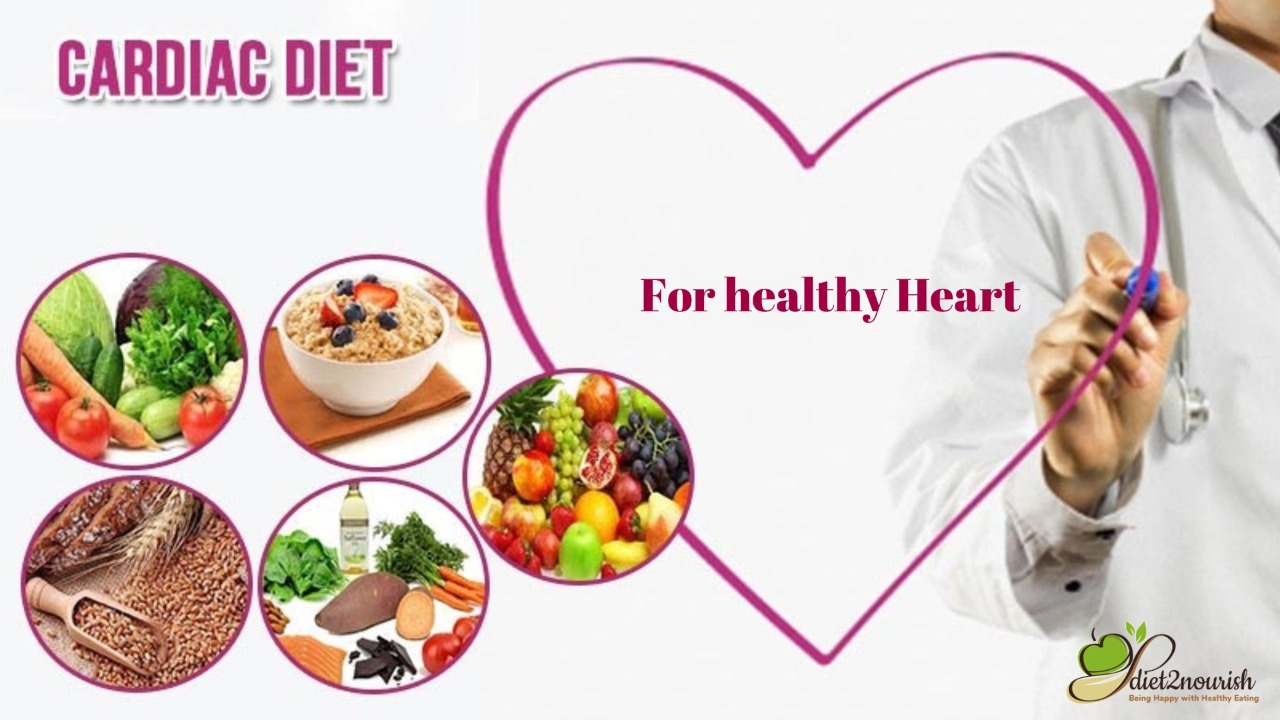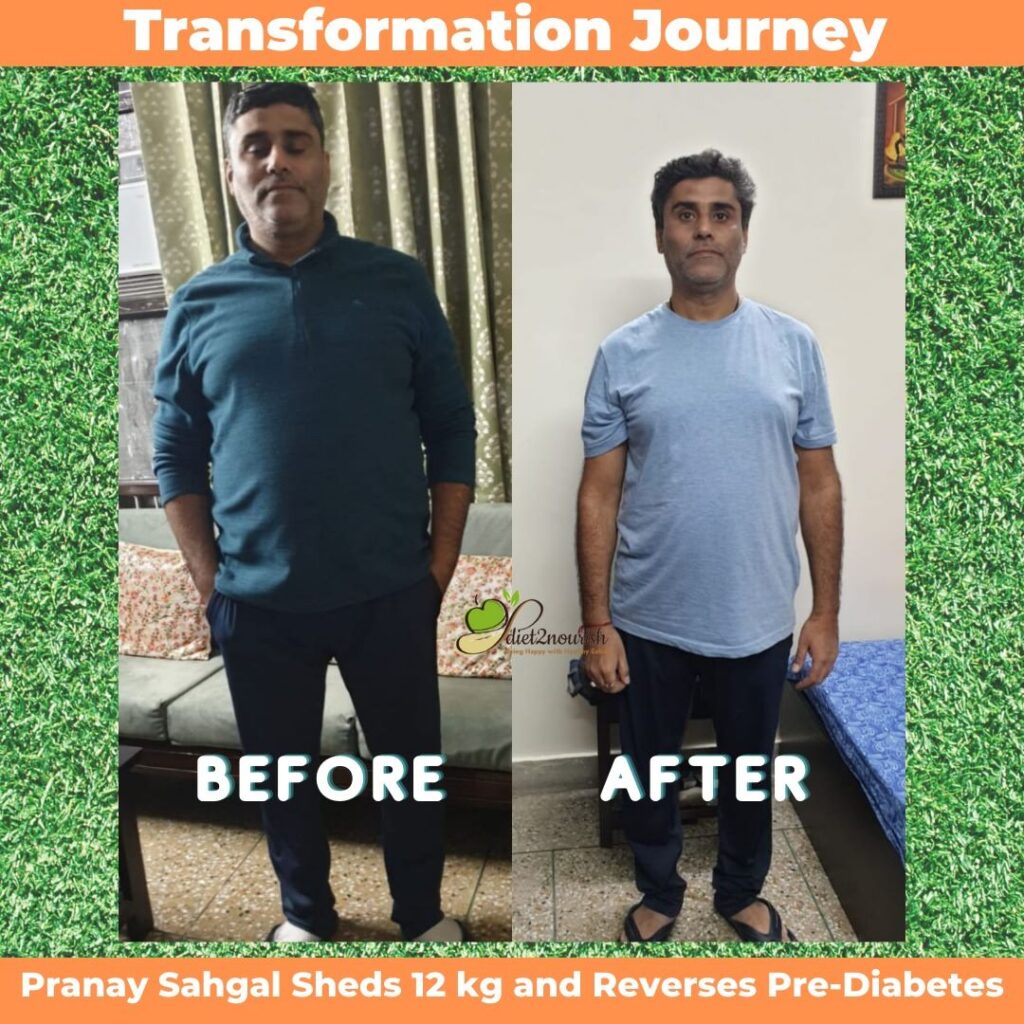Diet chart for cardiac patients – Cardiac health issues are nothing too new to the modern world. What once only used to be issues affecting the elderly, today even youngsters are falling prey to it. Cardiac health issues refer to the disorders, diseases, and malfunctioning of the human heart and its supporting delivery systems – the veins, arteries, and blood vessels.
Today heart diseases are the number one cause of death all across the globe. And it is believed that it is our lifestyle and the choices we make in our food, are the two biggest factors responsible for the majority of the heart diseases. hence, paying attention to what we eat, following a well-balanced cardiac diet chart, that allows us to consume a variety of healthy foods, and making modifications in our lifestyle, are the two most important preventative measures we can take.
Diet Chart for Cardiac Patients
There is numerous factor responsible for the increase in chances of developing cardiac diseases. though some factors may be out of our control, there are some that we can take care of. Some of these risk factors are even connected, like cholesterol and blood pressure, body weight, and management of diabetes, which can effectively be controlled with a diet chart for cardiac patients.
A cardiac diet chart emphasizes eating more foods like vegetables, whole grains, and oily fish. The diet also limits the consumption of processed and other foods with a higher concentration of salt and sugar.
Food for a Heart Patient
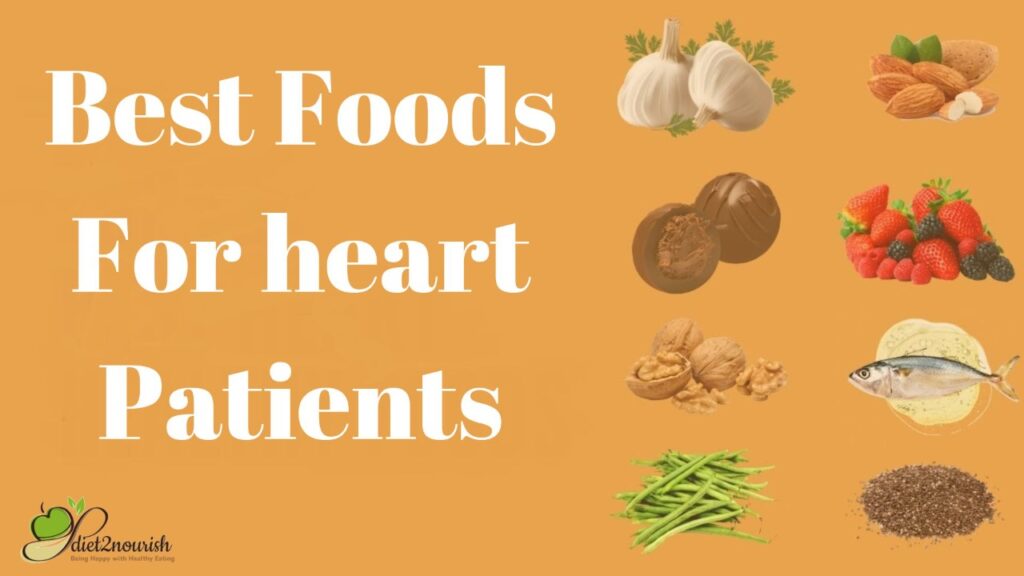
Everyone, including heart patients, should aim for a well-balanced, and heart-healthy diet. A typical diet chart for heart patients should include:
1. Plenty of fresh fruits and vegetables
The crux is to ‘eat the rainbow’, meaning to consume various colored fruits and vegetables every day. The aim should be to eat 5 servings each day. Fruits and vegetables, both have different antioxidants that can go a long way in protecting your heart. These foods are also an excellent source of fiber, which is very essential for good heart health. The best inclusion in any heart patient’s diet.
2. Healthy Fats
It is important for the heart that you choose the right kind of fats to eat. It is all because saturated and trans fats increase the amount of cholesterol in the blood, which in turn can increase the chances of developing heart/cardiac diseases.
Opt for unsaturated fats, monounsaturated (both found in olive oil, almonds, unsalted cashews, and avocado), and polyunsaturated (found in sunflower oil, walnuts, sunflower seeds, and oily fishes). These are healthier choices and are very good for your heart health.
3. Oily Fishes
Oily fishes such as salmon, herring, mackerel, trout, and tuna are rich in Omega-3 fatty acids. The anti-inflammatory property of Omega-3 is good for your heart.
4. Whole Grains
Limiting the intake of refined grains and opting for whole grains can help in protecting your heart from ailments. Whole grains like bread, pasta, and rice have more beneficial fiber, which is good for your heart.
5. Low-Fat Dairy
Choosing low-fat dairy over high-fat dairy will ensure that you consume less unsaturated fats in your diet. Choose skimmed milk and other low-fat dairy products.
6. Legumes, Nuts, and Seeds
It is believed that the best foods that can be included in any vegetarian diet chart for heart patients are legumes, nuts, and seeds. However, they may be dense in energy and hence high in cholesterol, nuts and seeds should be consumed in limited quantities.
Legumes:
Black beans, lentils, Garbanzo beans, and kidney beans.
Nuts:
Walnuts, hazel nuts, almonds, cashew nuts, and Brazil nuts.
Seeds:
Flax seeds, sunflower seeds, pumpkin seeds, and chia seeds.
There are certain foods and food groups that you should limit or avoid following a diet chart for heart blockage patients. These are:
7. Refined Carbohydrates
Refined carbs are responsible for blood sugar imbalance and also lack any fiber contents. Consuming lots of refined carbs like white bread, pasta, cakes, biscuits, pizza dough, sweets and desserts, white flour, and certain cereals over a long time can lead to weight gain and insulin resistance – the risk factors leading to heart blockages and cardiac diseases.
8. Processed Foods
Processed foods are high in sugar, saturated and trans fats, salt, and additives that are not at all good for your heart. Use whole foods instead for heart-healthy living.
9. Red Meats
Red and processed meats are sources of saturated fats. Replace all your processed and red meat consumption with more heart-healthy plant proteins like whole grains, nuts and seeds, legumes, fatty fish, and lean meats.
10. Sweetened Foods and Beverages
Processed and packaged foods and drinks contain added sugar, especially sodas and energy drinks. Avoiding excessive consumption of sugar will help you keep your weight in control, will not allow ay blood sugar to spike, and prevent you from heart diseases by keeping your heart healthy.
11. Salt
Consuming too much salt or sodium may raise your blood pressure levels and increase the chances of developing cardiac diseases. Instead of using salt, use natural herbs and spices to flavor your dishes.
12. Alcohol
Last but not the least, avoid excessive consumption of alcohol, to keep your heart healthy.
25 Heart Healthy Foods
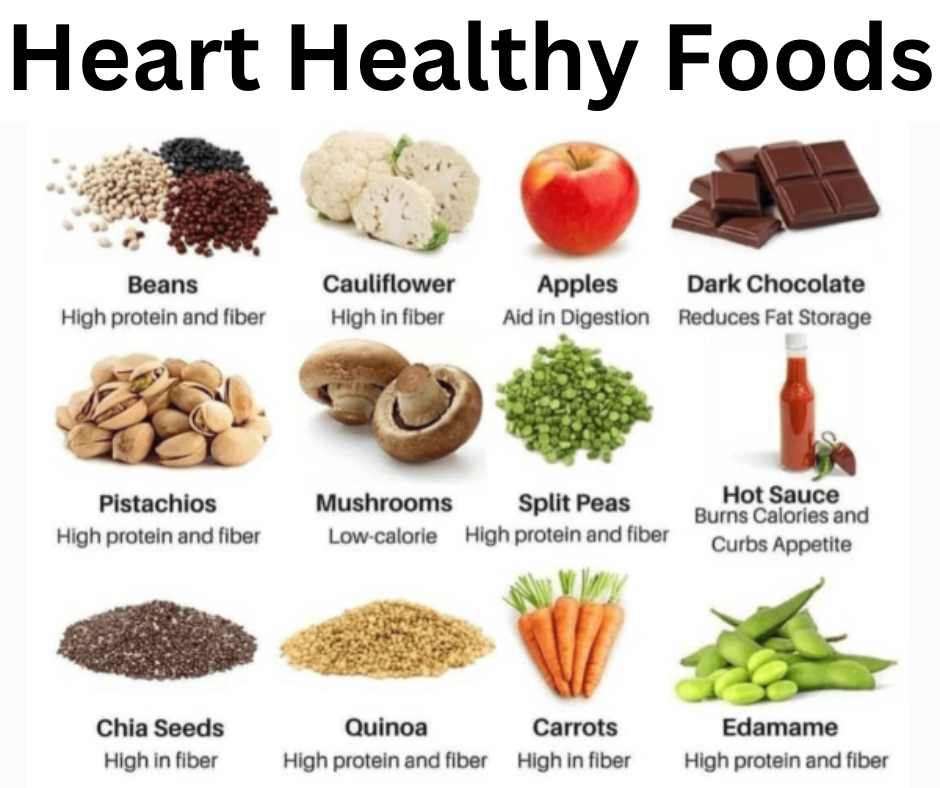
Here are 25 heart-healthy foods:
1. Salmon
2. Blueberries
3. Oatmeal
4. Walnuts
5. Spinach
6. Avocado
7. Tomatoes
8. Almonds
9. Dark chocolate
10. Broccoli
11. Red wine
12. Green tea
13. Garlic
14. Olive oil
15. Oranges
16. Sweet potatoes
17. Lentils
18. Flaxseeds
19. Tuna
20. Quinoa
21. Red bell peppers
22. Low-fat yoghurts
23. Brown rice
24. Apples
25. Pomegranates
How To Prevent Heart Diseases
Here are some ways to prevent heart diseases:
- Eat a heart-healthy diet that is low in saturated and trans fats, and high in fibre, fruits, and vegetables.
- Exercise regularly to maintain a healthy weight and improve cardiovascular health.
- Don’t smoke or use tobacco products, and avoid exposure to secondhand smoke.
- Limit alcohol consumption to moderate levels.
- Manage stress through relaxation techniques such as deep breathing, meditation, or yoga.
- Get regular checkups and screenings to monitor blood pressure, cholesterol, and other risk factors.
- Maintain a healthy weight and avoid obesity.
Diet Chart for heart stent patients
Heart diseases are majorly preventable and, in many cases also reversible via nutrition. Adapting to healthier nutritional behavior and making some tweaks in your daily lifestyle can go a long way in preventing you from all kinds of heart ailments.
But due to poor habits and poor eating choices, many of us develop a condition where our arteries – the coronary arteries become narrow and get blocked by the development of cholesterol plaques leading to heart attacks and heart failure. In such cases, coil-shaped stents are placed inside the narrow artery to keep it open and allow the flow of blood and oxygen freely.
If you have a stent been put inside you, you should be on a strict diet. The diet chart for heart patients after bypass surgery should be based on:
7 day diet chart for Cardiac Patients
Here is a sample 7-day diet chart for cardiac patients:
Day 1
- Breakfast:
Oatmeal with low-fat milk and fresh berries
Snack:
- Lunch:
Grilled chicken breast with roasted vegetables and brown rice
- Evening Snack:
Apple slices with almond butter
- Dinner:
Baked salmon with steamed broccoli and quinoa
Day 2
- Breakfast:
Greek yoghourt with sliced banana and walnuts
- Lunch:
Turkey sandwich on whole grain bread with avocado and mixed greens
- Evening Snack:
Fresh fruit salad
- Dinner:
Grilled shrimp with sautéed spinach and sweet potato
Day 3
- Breakfast:
Scrambled eggs with whole grain toast and sliced tomato
- Lunch:
Lentil soup with mixed green salad
- Evening Snack:
Fresh berries and pineapple chunks with low-fat whipped cream
- Dinner:
Baked chicken breast with roasted Brussels sprouts and sweet potato
Day 4
- Breakfast:
Whole grain cereal with low-fat milk and fresh berries
- Lunch:
Grilled vegetable wrap with hummus
- Evening Snack:
Fresh fruit smoothie
- Dinner:
Baked cod with roasted asparagus and quinoa
Day 5
- Breakfast:
Whole grain waffles with fresh berries and low-fat whipped cream
- Lunch:
Spinach salad with grilled chicken, strawberries, and balsamic vinaigrette
- Snack:
Fresh fruit salad
- Dinner:
Grilled steak with roasted vegetables and brown rice
Day 6
- Breakfast:
Egg white omelette with mixed vegetables and whole grain toast
- Lunch:
Grilled chicken Caesar salad with whole grain croutons
- Snack:
Whole grain crackers with low-fat cheese
- Dinner:
Baked salmon with roasted Brussels sprouts and quinoa
Day 7
- Breakfast:
Whole grain pancakes with fresh berries and low-fat whipped cream
- Lunch:
Tuna salad on whole grain bread with mixed greens
- Evening Snack:
Baby carrots with hummus
- Dinner:
Baked chicken breast with roasted vegetables and brown rice
1. Whole plant-based eating pattern
This is a type of diet that is based on naturally grown foods and excluded all types of animals and animal products, even honey, eggs, and dairy and dairy products. This type of diet is high in fiber and also eliminates excessive cholesterol from your digestive tract.
Foods to improve ejection fraction after angioplasty:
- Whole Grains: Foods like brown rice and wild rice, corn, and barley, should be taken 2-3 times a day to retain fiber and benefit your heart.
- Consume at least 6 to 8 servings of fruits and vegetables to let the body have all the necessary minerals, vitamins, and fibers.
- 3 servings of legumes (beans, lentils, and peas) provide the body with high-quality fiber and good-quality proteins.
- Flaxseeds, olives, avocados, and hemp seeds get you heart-healthy Omega-3.
- Walnuts, almonds, pistachios, and hazel nuts provide proteins, vitamins, fibers, minerals, antioxidants, and omega-3.
Diet chart for heart patients with diabetes
If you have diabetes, there is always a high risk of developing cardiac diseases. with high blood glucose levels, chances are there that you might develop atheroma – a condition where fatty materials start building up on the linings of the arteries, leading to stroke and heart attacks.
The diet chart for heart patients with diabetes should include healthy food choices like:
- At least five portions of fruits and vegetables a day.
- Whole grains
- Oily fishes
- Lean protein foods like non-processed meats, poultry, pulses, and nuts.
- Low-fat milk and dairy products.
Fatty treats and sugar should be limited, mainly focusing on the type of fat you consume. No saturated and trans fats. Salt intake should also be limited, and foods like eggs, organ meats, and prawns (high in cholesterol) should be avoided.
Frequently Ask Questions
To maintain your heart health and make sure that your heart stays fit and working, heart patients should maintain a healthy dietary pattern that emphasizes eating more fruits and vegetables, low-fat dairy and dairy products, whole grains, poultry without skin, fatty fishes, legumes, nuts and seeds, and non-tropical vegetable oils.
Follow these basic tips with your diet:
Mind your portion. Eat-in smaller plates.
Eat more fruits and vegetables. At least five servings a day.
Select whole grains over refined grains.
Limit your unhealthy fats intake. Choose unsaturated fats over saturated and trans fats.
Opt for low-fat protein sources.
Reduce or limit your salt or sodium intake.
Allow yourself occasional treats, and don’t starve.
Plan your meals for healthy and hearty eating.
Heart patients should avoid the consumption of:
Fast foods
Fried foods
Canned foods
Chips and candies
Processed and frozen meats
Cookies, cakes, and all baked goods
Biscuits
Ice creams
Condiments mainly, ketchup, mayonnaise, and all packaged dressings
Hydrogenated vegetable oils (trans fats)
Pizza, burgers, hot dogs, and fast foods
Deli meat
Red meat
Alcohol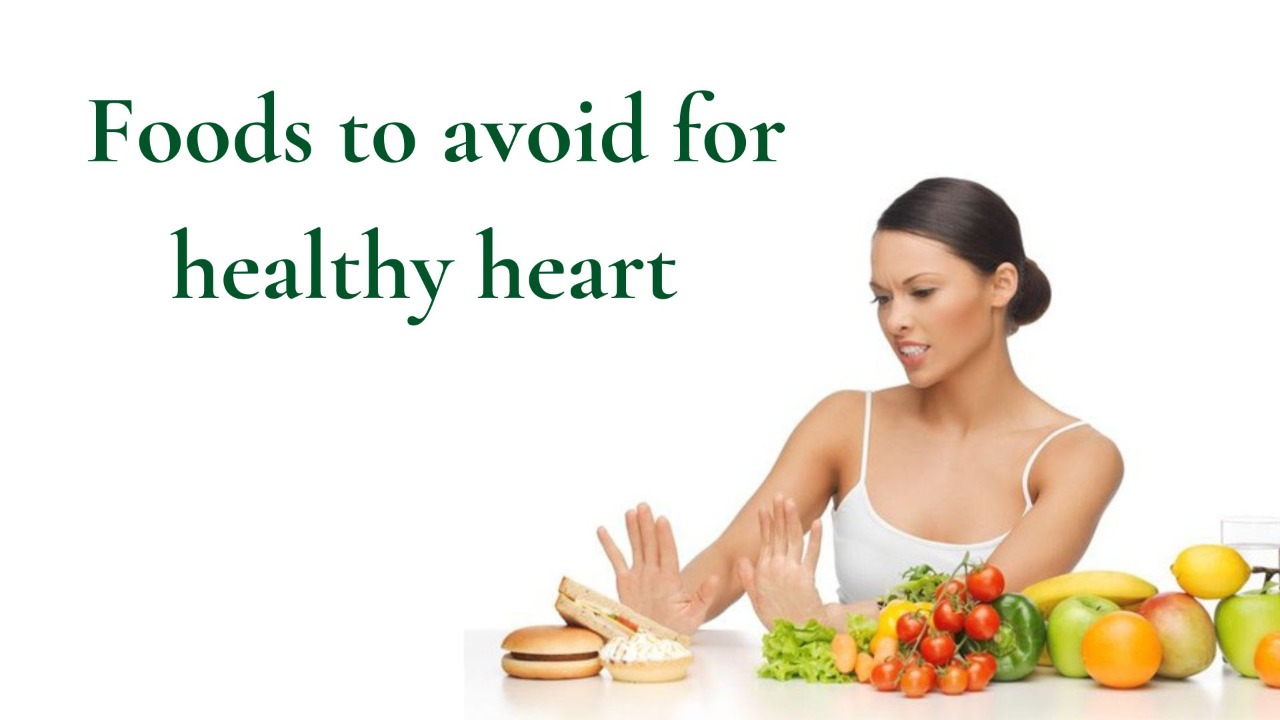
Every cardiologist will ask you to avoid a list of certain foods to keep your heart healthy. Out of the many, the three most common ones are:
Processed and packaged foods, snacks, and drinks: These foods are high in saturated fats, and calories, and have added ingredients like nitrates and sulfates. Not only are these foods bad for your heart and health, but are also responsible to improve the chances of developing cancers. Moreover, packaged foods are loaded with empty energy that increases the chances of obesity and thereby heart problems.
Salt or sodium: Excessive consumption of salt or sodium increases the chances of developing high blood pressure and thereby heart problems. Foods with higher salt content are typically high in carbs too. these foods also turn into calorie bombs, improving more chances of heart issues we face.
Unhealthy fats: Saturated and trans fats increase the amount of cholesterol in the blood, which in turn can increase the chances of developing heart/cardiac diseases.
Certain fruits have the power to influence our cholesterol levels, blood pressure, triglyceride, inflammation control, and thus our heart health. Fruits are one of these foods, and the best ones are:
Berries: Strawberries, blackberries, blueberries, and raspberries are rich in antioxidants and can reduce multiple risks of developing heart diseases.
Avocados: Rich in monounsaturated fats, avocados help in lowering cholesterol and lowering the risks of developing heart diseases.
Apples: Apples are rich in fiber and science advocates that eating apples regularly decreases the chances of developing high blood pressure.
Apricots: Apricots are rich sources of fiber and vitamin A, C, E, and K. They also have carotenoids and antioxidants necessary for good heart health.
Bananas: Bananas provide us with vitamins B6 and C. you also get fiber, magnesium, and potassium from them – all critical ingredients in keeping your blood pressure under check.
Answer:
To prevent heart disease, it is recommended that you consume no more than 2,300 milligrams of sodium per day. However, if you have high blood pressure or other risk factors for heart disease, your doctor may recommend that you consume even less sodium.
Answer:
Low to Moderate caffeine consumption is generally safe for most people with heart diseases. However, if you have arrhythmia or other heart conditions, then the doctor may recommend that you limit your caffeine intake. You can consult a dietitian for further information.

